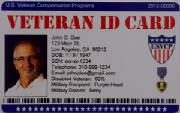|
|
|
|
|
|
TIP:
If you already have a claim pending for compensation and/or pension with the VA and need to provide information or
upload attachments, you can use VA Form 21-4138, Statement in Support of Claim,
available in VONAPP. When uploading attachments, include a statement that you are attaching evidence to support your
claim. After completing the form, you will have the opportunity to attach your documents.
You can attach up to 5 electronic files to any VONAPP application
before you submit it using VONAPP. The total size of all attachments must be 1 megabyte or less and must be one
of the following file types: .doc, .xls , .gif, .jpeg, .jpg, .bmp, .tif , .txt , .pdf . TIP: One of the harsh realities of working with any bureaucratic system is the culture of apathy.
Inherent in the VA culture is the absence of built-in incentives to do a job well. Missing is the
motivation to go the extra mile, above and beyond the call of duty, if you will. Granted, there are some
who rise above the sluggish indifference of the VA culture. Most, however, just stagger through their daily
routines with very little concern for those they are working for. Oftentimes, the details of a claim that
determine if a veteran is to be awarded benefits are missed by those who lack the drive to search for data needed to award
a claim.
Therefore, our research
indicates that a veteran must take the initiative to make sure details of his claim are seen, viewed, and processed.
One way of doing that is to highlight all relevant information. For instance, a veteran who
experienced combat trauma must highlight the details on his C-file or stressor letter. If a veteran was wounded in a firefight, he must highlight the details of the battle. Yellow
highlighters seem to work best. Like a moth to a flame, raters are drawn to bright colors.
Never assume the
raters or your Veterans Service Officer (VSO) will highlight your data for you. For best results, you must do it yourself. See Highlight Examples:
| Military Medical Record | Civilian Medical Record | PTSD Summary Letter | Stressor Letter | TIP: There
is no question that the cost of making copies of medical records is both expensive for the patient and lucrative for the medical
profession. It is estimated that the medical profession makes billions of dollars every year from the practice
of charging patients for copies of their medical records. Luckily, the VA has not implemented charging
veterans for copies of their medical records. As a veteran, you can mostly request your medical records
free of charge. But, how do you, as a veteran, get free copies of your medical records from a civilian
practitioner? One easy and simple way is to use the services of your local Vet Center. When you are engaged in using the services of your local Vet Center, ask your Vet Center counselor to request your medical records from your civilian medical professional. Another surefire way to get a copy of your civilian
records at no charge is to sign a Release of Information form and have your civilian practitioner fax or mail your records
to your Vet Center. As part of an effective treatment plan, your Vet Center counselor may be able to extrapolate data from your civilian medical records and use it to formulate an effective psychological
treatment plan for you. At the same time, once your counselor receives the medical records, your Vet Center counselor will be more than happy in giving you a copy of your civilian medical records, at no cost to you.
Evidence Used to Support Stressful Military Event If you are a combat veteran, a veteran during war time, or served in a capacity where you experienced stressful military events, you may find the following evidence helpful in supporting your claims:
|
|
|
Submit A Compensation Tip
|
|
|
|

